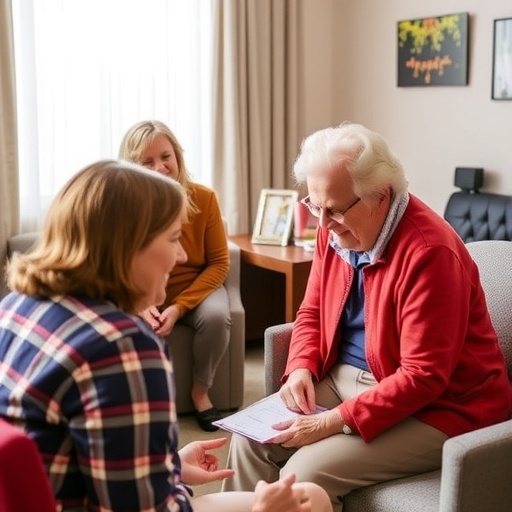A groundbreaking study conducted by researchers at University College London (UCL) unveils compelling evidence that stroke survivors who engage in talking therapies are significantly more likely to experience meaningful improvements in depression and anxiety symptoms. This extensive observational study, unprecedented in scale and scope, meticulously analyzed data from nearly two million individuals who accessed NHS Talking Therapies for Anxiety and Depression across England over a seven-year period. Among this vast cohort, 7,597 were stroke survivors, offering a robust dataset to evaluate the effectiveness of psychological interventions in a population often challenged by complex physical and cognitive health issues.
Stroke, a debilitating cerebrovascular event, frequently leaves survivors grappling not only with physical disabilities such as motor impairment but also with profound psychological sequelae, particularly depression and anxiety. Epidemiological data suggest that upwards of one in three stroke survivors suffer from these mental health conditions, exerting a detrimental impact on rehabilitation trajectories and overall survival outcomes. Prior literature has indicated that post-stroke depression, if untreated, correlates with a 20 to 50 percent elevated mortality risk in subsequent years compared to stroke survivors without depression, underscoring the urgency for effective mental health interventions in this demographic.
The UCL-led research presents a nuanced exploration into the application of NHS Talking Therapies—which include cognitive behavioral therapy (CBT), counseling, and guided self-help modalities—within this vulnerable group. Conducted between 2012 and 2019, the analysis revealed that 71 percent of stroke survivors participating in these talking therapies exhibited reliable improvement, denoting symptom changes unlikely attributable to random variation. Remarkably, 49 percent achieved reliable recovery from depression and anxiety, a benchmark closely aligned with the NHS’s national target of 50 percent recovery among all treatment completers, despite the general expectation that those with chronic physical health conditions fare worse in psychological treatments.
The tools used for symptom evaluation were the Patient Health Questionnaire (PHQ-9) for depression and the Generalized Anxiety Disorder questionnaire (GAD-7) for anxiety. The PHQ-9 assesses critical parameters such as anhedonia, sleep disturbances, and pervasive low mood, while the GAD-7 quantifies the frequency of anxiety symptoms like excessive worry, restlessness, and difficulty relaxing. The data indicated that stroke survivors attending talking therapies experienced moderate reductions in depressive symptoms and functional impairments, which encompasses activities of daily living such as work capability, home management, and social functioning. Notably, reductions in anxiety symptoms were pronounced, illustrating the efficacy of these psychological interventions in ameliorating the burden of anxiety post-stroke.
Timeliness emerged as a pivotal factor influencing therapeutic outcomes. Stroke survivors who commenced talking therapy within six months of their cerebrovascular event demonstrated significantly higher rates of reliable recovery compared to those who delayed treatment for one year or more. This finding persists irrespective of covariates such as age, gender, socio-economic status as measured by area deprivation indices, and baseline symptom severity, highlighting the critical window for mental health intervention post-stroke to optimize recovery.
Despite these encouraging findings, the study also uncovered that stroke survivors are somewhat less likely to reliably recover and more prone to reliable deterioration in psychological state post-treatment compared to their non-stroke counterparts with depression or anxiety. However, when accounting for the burden of additional co-morbid physical health conditions—more prevalent among the stroke population—these differences lose statistical significance. This insight suggests that the complexity of physical health comorbidities in stroke survivors partially underlies the differential treatment responses observed.
The research team advocates that while NHS Talking Therapies are effective, there is an imperative to tailor these interventions more precisely to the nuanced needs of stroke survivors. Cognitive impairments, sensory deficits, and physical disabilities common in this group may necessitate adaptations in therapeutic approach and delivery to enhance accessibility and engagement, thereby maximizing clinical benefits. Integrative approaches that acknowledge the multidimensional challenges post-stroke are vital for advancing mental health care within this population.
Professor Joshua Stott, co-author from UCL Psychology & Language Sciences, stressed the essential need for enhanced clinician training. Mental health professionals must be equipped with specialized skills to manage long-term physical health conditions, especially in patients who present with cognitive and sensory impairments that complicate psychological therapy. This specialized training could markedly improve outcomes by fostering a holistic treatment paradigm that bridges the physical-psychological health interface.
The study’s implications resonate beyond individual therapy outcomes, signaling broader healthcare system benefits. Early and effective psychological intervention post-stroke can accelerate physical and cognitive rehabilitation, reduce healthcare utilization, and ultimately, diminish the elevated mortality risks associated with untreated post-stroke mental health conditions. The free availability of NHS Talking Therapies positions them as a pivotal resource in the integrated stroke care pathway, but strategic improvements targeting stroke-specific challenges remain a key objective.
Lead author Dr. Jae Won Suh emphasized the urgency of systematic screening for depression and anxiety symptoms among stroke survivors in primary care settings. Prompt identification followed by early referral to psychological therapies is crucial for harnessing the full therapeutic potential of these interventions. The findings underscore a call to action for general practitioners and stroke clinicians alike to embed mental health evaluation as a standard component of stroke aftercare.
Funded by the Alzheimer’s Society, this study represents a significant stride in elucidating the intersection of neurological insult and psychological recovery. It affords robust epidemiological evidence supporting the routine integration of talking therapies in post-stroke treatment paradigms, while illuminating pathways for refinement that could transform clinical practice and patient experience.
As mental health continues to gain prominence within the framework of comprehensive stroke management, this pioneering analysis from UCL reinforces the message that effective psychological care is not merely ancillary but foundational to optimizing long-term outcomes for stroke survivors. The onus rests on healthcare systems to adapt and evolve service delivery accordingly, ensuring that the multifaceted needs of this complex patient population are met with evidence-based, compassionate care.
Subject of Research: People
Article Title: Effectiveness of primary care psychological therapy post-stroke: a record-linkage study of 1.9 million adults in England
News Publication Date: 5-Jun-2025
Web References: http://dx.doi.org/10.1038/s44220-025-00429-z
References: Published in Nature Mental Health
Keywords: Mental health, Health care, Anxiety, Depression




